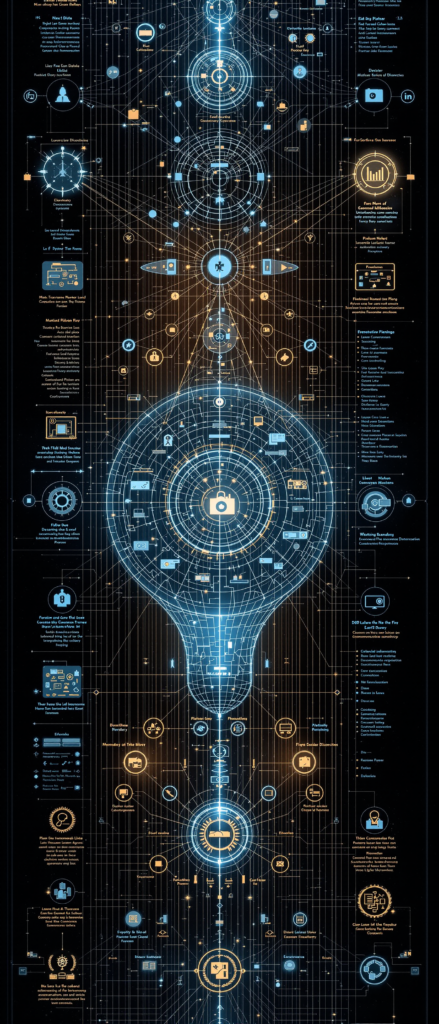A Blueprint for Secure Agent Interaction
As autonomous AI agents grow in sophistication and proliferate across industries, a crucial question emerges: How will these intelligent systems securely interact, share information, and coordinate their activities?
The current ad hoc approach to agent connections—relying on API keys, cloud credentials, and centralized platforms—cannot support the secure, scalable agent ecosystems we’ll need in the future.
Enter the concept of an “AgenticOS”—a specialized operating system designed specifically for AI agents. Just as traditional operating systems manage hardware resources and provide interfaces for applications, an AgenticOS would serve as the foundation for secure agent interactions, resource allocation, and governance. This article explores the core components of such a system, focusing on how blockchain technology could provide the security foundations needed for agents to safely interact in increasingly complex environments.
The Need for an Agent Operating System
Current Integration Challenges
Today’s autonomous agents operate in isolated environments with limited interaction capabilities. When agents need to work together or access external resources, they typically rely on:
- Hard-coded API credentials with broad access permissions
- Centralized cloud services that create single points of failure
- Custom integration code that’s difficult to audit and secure
- Proprietary protocols that limit interoperability
This fragmented approach creates significant challenges as agent ecosystems scale and become more complex. Security vulnerabilities multiply, integration costs rise, and the potential for unintended consequences increases dramatically.
The Promise of an Integrated Approach
An AgenticOS would address these limitations by providing a standardized foundation for agent interactions, with built-in security, identity management, and governance. Key benefits would include:
- Reduced integration costs across agent systems
- Standardized security protocols and permissions
- Transparent audit trails of agent activities
- Scalable governance mechanisms as systems grow more complex
- Economic models for resource allocation and incentive alignment

Core Components of an AgenticOS
What would a specialized operating system for autonomous agents look like? While still theoretical, several key components are emerging as essential:
Secure Identity Framework
At the heart of any secure agent interaction is verified identity. An AgenticOS would need robust mechanisms to:
- Assign unique, cryptographically secure identities to each agent
- Verify agent capabilities, permissions, and ownership
- Track reputation and past performance
- Prevent identity spoofing or unauthorized impersonation
Blockchain technology offers a promising foundation for this identity layer. Through cryptographic key pairs, on-chain registration, and immutable history, blockchain can provide agent identities that don’t rely on centralized authorities or single points of failure.
For example, each agent could have an on-chain identity that includes:
- Public/private key pairs for secure authentication
- Verifiable credentials listing capabilities and permissions
- Reputation scores based on past interactions
- Ownership records linking to human or organizational controllers
Trust-Minimized Communication Protocol
Once agents have secure identities, they need standardized ways to communicate. An AgenticOS would include secure communication protocols—something akin to an “Agent-HTTP”—with built-in authentication, encryption, and access controls.
This protocol would handle:
- Agent authentication before any data exchange
- Permission verification for requested actions
- Encrypted data transmission
- Transparent logging of interactions
- Proof of message origin and integrity
In a blockchain-secured system, this might involve:
- Initial handshake where agents verify each other’s on-chain credentials
- Smart contract verification of access permissions
- Transaction of tokens for paid services or data
- Encrypted data exchange with on-chain verification
- Immutable logging of the interaction’s metadata
Resource Allocation and Access Control
Agents require access to various resources—data, computational power, specialized services, and external APIs. An AgenticOS would manage these resources through:
- Granular permission systems for data and service access
- Usage monitoring and quotas to prevent abuse
- Economic mechanisms for fair resource allocation
- Automated auditing of resource usage
By using blockchain-based access control, an AgenticOS could maintain an immutable access ledger that logs exactly what data each agent can access, under what conditions, and at what cost. Smart contracts could automatically enforce these permissions without relying on centralized gatekeepers.
For instance, when an agent needs to access sensitive customer data, the system would:
- Verify the agent’s identity and permissions
- Check if access conditions are met (time restrictions, purpose limitations)
- Record the access attempt on the blockchain
- Grant temporary, minimal access rights
- Log all data retrieved for future audit
Tokenized Economy for Services and Data
As agent ecosystems grow, economic incentives become crucial for resource allocation and quality assurance. An AgenticOS would include tokenized economic mechanisms to:
- Enable micropayments for agent services
- Create markets for high-quality data
- Reward valuable contributions to the ecosystem
- Allocate computational resources efficiently
Using blockchain-based tokens and smart contracts, these economic systems could operate without centralized payment processors or intermediaries. Agents could hold tokens in secure wallets, make instant micropayments for services, and receive compensation for their own contributions.
Examples of tokenized transactions might include:
- Paying for access to premium data sources
- Compensating specialized agent services
- Staking tokens to verify data quality
- Receiving tokens for contributing valuable information
Governance and Coordination Mechanisms
As agent systems grow more complex, governance becomes essential. An AgenticOS would include mechanisms for:
- Collective decision-making about system upgrades
- Dispute resolution when agents conflict
- Risk management for potentially harmful actions
- Coordination of complex multi-agent workflows
Blockchain-based governance tools, such as DAOs (Decentralized Autonomous Organizations), provide models for how agent collectives might self-govern. Through on-chain voting, reputation systems, and transparent rules, agent swarms could make collective decisions without centralized control.
For instance, a multi-agent system might vote on:
- Admission of new specialized agents to the collective
- Updates to shared protocols or standards
- Resource allocation for collective goals
- Responses to security threats or anomalies
How Blockchain Can Address These Limitations
Blockchain technology—with its focus on decentralized trust, secure transactions, and verifiable identity—offers solutions to many of the key challenges facing autonomous agents:
Secure Identity Management
Blockchain provides a foundation for verifiable agent identity through:
- Cryptographic key pairs that uniquely identify each agent
- On-chain registration of agent capabilities and permissions
- Immutable reputation systems that track an agent’s history
- Decentralized identity verification without central authorities
With blockchain-based identity, agents could establish trust with each other and with external systems without relying on centralized gatekeepers.
Verifiable Data Sources
Blockchain enables data verification through:
- Immutable records of data provenance
- Timestamping to verify data recency
- Cryptographic proofs of data integrity
- Consensus mechanisms to validate information
For agents, this means being able to verify that information comes from trusted sources and hasn’t been tampered with—a critical foundation for reliable decision-making.
Standardized Context Protocol with MCP
The Model Context Protocol (MCP) offers a standardized approach to context management that addresses the contextual limitations of current agent systems:
- Cryptographically signed context objects ensure the integrity and provenance of shared context
- Standardized metadata enables efficient context transfer between different agents and systems
- Versioning mechanisms track the evolution of context throughout complex processes
- Permission-based access controls preserve confidentiality while enabling appropriate sharing
When implemented on blockchain infrastructure, MCP provides a secure, transparent mechanism for context sharing that enhances agent collaboration while maintaining security and privacy.
Economic Mechanisms for Resource Allocation
Blockchain introduces economic incentives that could solve orchestration challenges:
- Tokenized micropayments for agent services and API access
- Smart contracts to govern agent interactions
- Staking mechanisms to ensure quality of service
- Market-based allocation of computational resources
These economic mechanisms could enable efficient coordination of large agent networks, with resources flowing to the most valuable services.
Technical Implementation Approaches
While a full AgenticOS remains theoretical, several technical approaches show promise for implementing its key components:
Blockchain-Based Implementation
Blockchain platforms like Ethereum, Polkadot, or purpose-built chains could serve as the foundation for an AgenticOS, providing:
- Native support for identity and authentication
- Smart contract capabilities for access control
- Token standards for economic transactions
- On-chain storage for critical metadata
- Consensus mechanisms for collective decisions
However, blockchain’s throughput limitations would require careful design. Most data would likely be stored off-chain, with blockchain reserved for identity, permissions, and critical transaction records.
Hybrid On-Chain/Off-Chain Architecture
A more scalable approach might combine blockchain for security and trust with traditional distributed systems for performance:
- Blockchain layer: Handles identity, authentication, permissions, and economic transactions
- Off-chain layer: Manages data storage, computation, and high-throughput communication
- Bridge protocols: Connect the security of blockchain with the performance of distributed systems
This hybrid approach could provide the security benefits of blockchain while maintaining the performance needed for real-time agent interactions.
Zero-Knowledge Proof Integration
For privacy-sensitive applications, zero-knowledge proofs could allow agents to verify important facts without revealing underlying data:
- Agents could prove they have valid permissions without revealing identity details
- Data providers could verify data quality without exposing the data itself
- Compliance with rules could be verified without disclosing specific actions
- Reputation could be established while maintaining operational privacy

Practical Applications and Use Cases
What would an AgenticOS enable that current systems cannot? Several emerging use cases illustrate the potential:
Secure Multi-Agent Workflows
Complex business processes could be handled by teams of specialized agents, each with specific roles:
- A customer-facing agent gathers requirements
- Research agents collect and verify relevant information
- Analysis agents process the information and develop recommendations
- Implementation agents execute the chosen solution
With an AgenticOS, these agents could securely collaborate even if they belong to different organizations or run on different platforms. Their interactions would be governed by verifiable rules, transparent permissions, and clear audit trails.
Cross-Organization Data Collaboration
Organizations could safely share sensitive data with specific constraints:
- Healthcare organizations could share anonymized patient data for research
- Supply chain partners could exchange inventory information
- Financial institutions could collaborate on fraud detection
The AgenticOS would ensure that data access follows agreed rules, all usage is logged immutably, and economic incentives maintain data quality and availability.
Decentralized Knowledge Marketplaces
Specialized knowledge could be monetized through agent interactions:
- Expert agents could sell analysis or predictions
- Data collection agents could monetize verified information
- Training agents could offer personalized learning experiences
- Curation agents could provide vetted information collections
The tokenized economy within the AgenticOS would enable micro-transactions, quality verification, and fair compensation without centralized platforms taking large cuts of the value created.
Challenges and Considerations
While promising, the development of an AgenticOS faces significant challenges:
Technical Hurdles
- Performance scalability for millions of agent interactions
- Integration with existing systems and infrastructure
- Balancing on-chain security with computational efficiency
- Standardization across diverse agent architectures and capabilities
Security Considerations
- Preventing novel attack vectors in agent-to-agent interactions
- Maintaining security as agent capabilities grow more complex
- Protecting private keys and credentials in autonomous systems
- Detecting and mitigating compromised agents
Governance Questions
- Who controls upgrades to the core protocol?
- How are disputes between agents resolved?
- What mechanisms prevent harmful emergent behaviors?
- How is accountability maintained in autonomous systems?
Regulatory Landscape
- Compliance with data protection regulations like GDPR
- Legal status of agent-to-agent transactions
- Liability for autonomous agent actions
- Cross-border enforcement of rules and standard

The Path Forward
The development of a comprehensive AgenticOS will likely follow an evolutionary path:
Near-Term Developments
- Standardized protocols for agent identity and authentication
- Basic blockchain integration for secure agent interactions
- Simple economic models for agent services and data
- Limited multi-agent coordination frameworks
Mid-Term Possibilities
- Comprehensive agent identity ecosystems
- Sophisticated permission and access control systems
- Advanced economic mechanisms for resource allocation
- Cross-platform agent coordination standards
Long-Term Vision
- Fully autonomous agent collectives with self-governance
- Global agent interaction standards
- Seamless integration between human and agent economies
- Complex multi-agent systems that handle entire business processes
The concept of an AgenticOS represents a critical missing layer in the emerging autonomous agent ecosystem. By providing secure identity, trusted communication, resource management, economic incentives, and governance mechanisms, such an operating system would enable the secure, scalable agent interactions needed for truly transformative AI applications.
Blockchain technology offers promising building blocks for this system—particularly for identity, trust, and economic transactions. However, realizing the full vision will require innovations in scalability, privacy, and governance that go beyond current blockchain capabilities.
As autonomous agents become more capable and ubiquitous, the development of secure interaction frameworks becomes increasingly urgent. The organizations and communities that establish these foundations will shape how AI systems interact for decades to come, influencing everything from business processes to social systems.
The AgenticOS is not just a technical system—it’s the foundation for a new kind of digital economy where intelligent agents collaborate, compete, and create value in ways we’re only beginning to imagine. By developing these frameworks now, we can ensure that the autonomous systems of the future operate in secure, transparent, and beneficial ways.
About The Kernel
Headquartered in Charleston, South Carolina, The Kernel is a unique advisory firm serving emerging technologies, global enterprises, and capital providers. Founded by a team of veteran technologists and investment management professionals, The Kernel is united by a mission to drive growth through innovation. With a proven model of identifying, validating, deploying, and investing in emerging technologies, The Kernel consistently delivers successful outcomes for its enterprise clients and capital partners. Learn more at https://thekernel.io.

